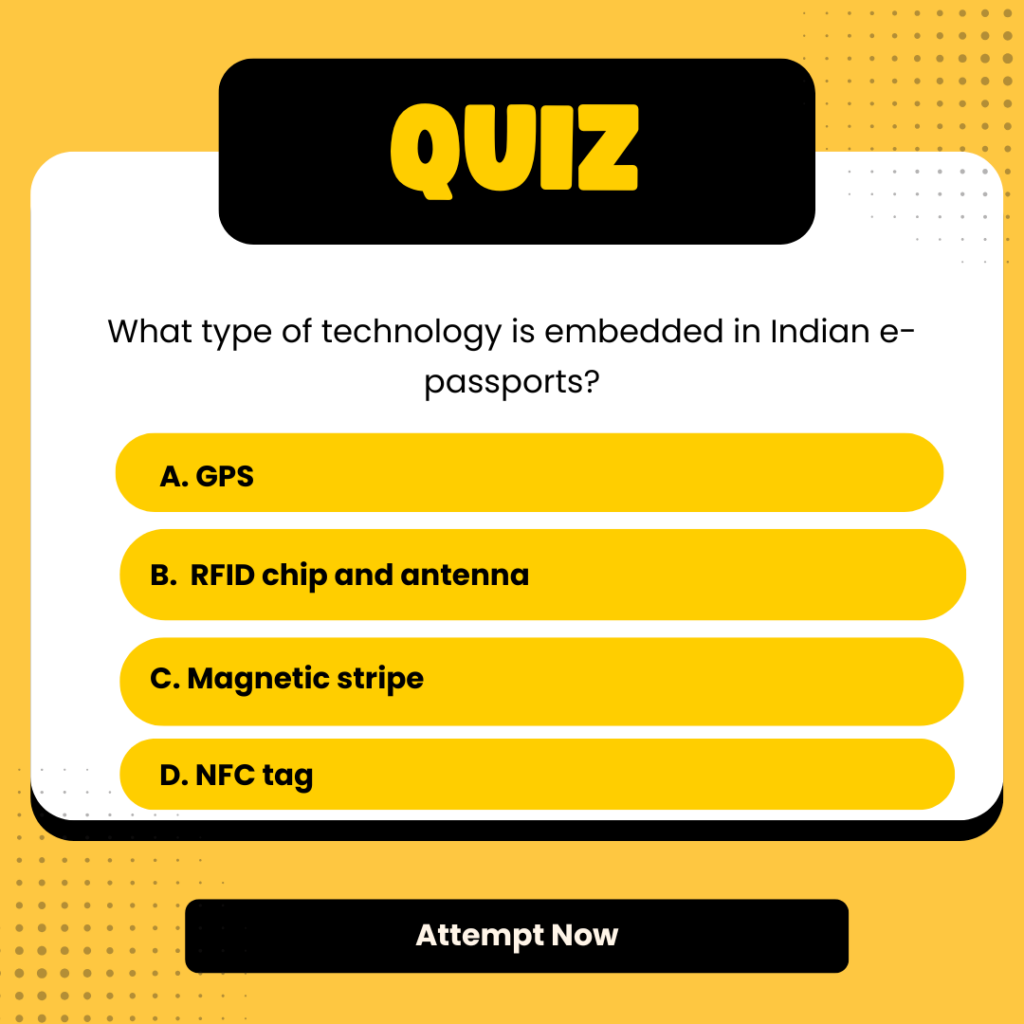India has embarked on a significant step forward in modernizing travel documents with the launch of chip-based e-passports. This innovation enhances security, streamlines immigration processes, and aligns Indian passports with global standards.
The initiative began under the Passport Seva Programme (PSP) Version 2.0, launched on April 1, 2024, with a pilot rollout in select cities. By March 22, 2025, over 20,000 e-passports had already been issued in Tamil Nadu alone, marking a significant milestone in the nationwide implementation.
What Is an e-Passport and How Does It Work in India?
An e-passport, also known as a biometric passport, is an enhanced version of the traditional Indian passport. It contains a Radio Frequency Identification (RFID) chip and antenna embedded in the back cover. This chip securely stores the passport holder’s personal details and biometric data, including fingerprints and a digital photo.
The front cover of an Indian e-passport can be identified by a gold-coloured chip symbol, distinguishing it from regular passports.
How Are e-Passports Different from Regular Passports in India?
| Feature | Regular Passport | e-Passport |
|---|---|---|
| Data Storage | Printed Only | Stored in RFID Chip |
| Security | Limited | Encrypted with PKI |
| Biometric Info | Not Included | Fingerprints, Photo |
| Tampering | More Vulnerable | Tamper-Proof |
| Processing Speed | Manual Verification | Automated Systems |
The key difference is the integration of electronic chips and biometric authentication, which makes e-passports highly secure and less prone to forgery or misuse.
Who Is Eligible for an e-Passport in India?
As of now, Indian citizens applying for new passports or renewals in select cities are eligible for an e-passport. The program is currently being expanded, and the Ministry of External Affairs (MEA) plans to implement e-passport issuance across all Passport Seva Kendras (PSKs).
Eligibility remains the same as for traditional passports, including:
- Proof of Indian citizenship
- Required identity and address documents
- No criminal record or travel restrictions
What Are the Benefits of e-Passports for Indian Citizens?
e-Passports offer several advantages over conventional passports:
- Enhanced Data Security: Personal and biometric information is encrypted using Public Key Infrastructure (PKI).
- Faster Immigration: Automated e-gates and biometric scanners reduce wait times.
- Global Compatibility: Conforms to ICAO (International Civil Aviation Organization) standards.
- Reduced Fraud: Strong encryption helps prevent identity theft and document tampering.
- Ease of Verification: Instant data validation during international travel.
How Can You Apply for an e-Passport in India?
To apply for an e-passport:
- Visit the Passport Seva Portal: https://www.passportindia.gov.in
- Register/Login to your account.
- Fill the application form for a new passport or renewal.
- Schedule an appointment at a Passport Seva Kendra (PSK) where e-passports are being issued.
- Provide biometric details and documents during your visit.
- Track your application online until delivery.
Note: e-Passports are being issued only at select regional offices as of now.
When Will e-Passports Be Available Across India?
Currently, e-passports are being issued in:
- Chennai (since March 3, 2025)
- Nagpur
- Bhubaneswar
- Jammu
- Goa
- Shimla
- Raipur
- Amritsar
- Jaipur
- Hyderabad
- Surat
- Ranchi
The nationwide rollout will continue in phases, with full implementation expected by late 2025 or early 2026, depending on the readiness of passport offices and supporting infrastructure.
What Technology Powers India’s e-Passports?
India’s e-passports are powered by:
- RFID (Radio Frequency Identification) chips for contactless data transfer
- Biometric authentication (face and fingerprint data)
- PKI (Public Key Infrastructure) to ensure data encryption and validation
- ICAO-compliant standards to make them acceptable across all major countries
This tech stack ensures data integrity, global compatibility, and resistance to tampering.
Is Your Data Safe with India’s e-Passports?
Yes, your data is secure. The RFID chip stores encrypted information, which can only be accessed by authorized readers at immigration checkpoints. The use of PKI technology ensures that:
- Data cannot be altered without detection
- The identity of the passport holder is verified through biometric matches
- Fraudulent cloning is virtually impossible
How Do e-Passports Improve Airport Security and Immigration?
e-Passports streamline the passenger experience by enabling:
- Automated e-Gate clearance at major airports
- Instant identity verification
- Reduced human error during manual checks
- Faster processing at immigration desks
This not only improves efficiency but also enhances border security by identifying suspicious travel patterns or forged documents.
What Should Indian Travelers Know About Using e-Passports Abroad?
Indian travelers with e-passports can:
- Use e-gates at international airports that support biometric entry systems
- Enjoy faster processing in countries that recognize ICAO-standard e-passports
- Feel more secure due to stronger protection against identity theft
However, travelers should:
- Keep the passport chip undamaged
- Store it safely in RFID-blocking covers if concerned about remote scanning
- Verify visa policies, as having an e-passport doesn’t eliminate the need for visas




 7 Festivals Around the World that Celebr...
7 Festivals Around the World that Celebr...
 7 Countries that Celebrate Holi Like Ind...
7 Countries that Celebrate Holi Like Ind...
 Different Names of Holi in India: Know t...
Different Names of Holi in India: Know t...








